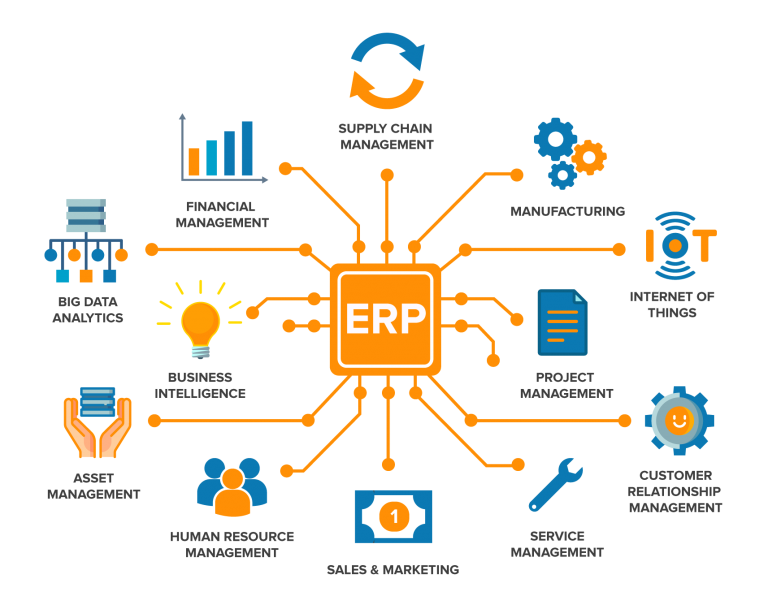
Enterprise resource planning (ERP) refers to a type of software that organizations use to manage day-to-day business activities such as accounting, procurement, project management, risk management and compliance, and supply chain operations. A complete ERP suite also includes enterprise performance management, software that helps plan, budget, predict, and report on an organization’s financial results.
ERP systems tie together a multitude of business processes and enable the flow of data between them. By collecting an organization’s shared transactional data from multiple sources, ERP systems eliminate data duplication and provide data integrity with a single source of truth.
BNF CONSULT provides different services of ERP packages. These include but not limited to Hospital Management System, Property Management System, School Management System and many others. Click Here to See Our ERP SERVICES
Today, ERP systems are critical for managing thousands of businesses of all sizes and in all industries. To these companies, ERP is as indispensable as the electricity that keeps the lights on.
How can these solutions manage organizations day-to-day business activities, such as accounting, finance, procurement, project management, supply chain, and manufacturing.
Enterprise resource planning systems are complete, integrated platforms, either on-premises or in the cloud, managing all aspects of a production-based or distribution business. Furthermore, ERP systems support all aspects of financial management, human resources, supply chain management, and manufacturing with your core accounting function.
ERP systems will also provide transparency into your complete business process by tracking all aspects of production, logistics, and financials. These integrated systems act as a business’s central hub for end-to-end workflow and data, allowing a variety of departments to access.
ERP Systems and software support multiple functions across the enterprise, mid-sized, or small businesses, including customizations for your industry.
Although the term “financials” is often used when describing ERP software, financials and ERP are not the same thing. Financials refers to a subset of modules within ERP.
Financials are the business functions relating to the finance department of an organization and includes modules for financial accounting, subledger accounting, accounting hub, payables and receivables, revenue management, billing, grants, expense management, project management, asset management, joint venture accounting, and collections.
Financials software uses reporting and analytical capabilities to comply with the reporting requirements of governing bodies, such as the International Financial Reporting Standards Foundation (IFRS), Financial Accounting Standards Board (FASB) for Generally Accepted Accounting Principles in the United States (GAAP), as well as for other countries (HGB in Germany and PCG in France, for example).
For public organizations, financials software has to be able to produce periodic financial statements for governing regulators, such as the US Securities and Exchange Commission (SEC) (with reports such as quarterly 10-Q and annual 10-K), European Securities and Markets Authority (ESMA), and others. For these types of financial reports, a narrative reporting tool is used. The person who is ultimately responsible for financials is the CFO.
While financials handles one area of the business, ERP encompasses a wide range of business processes—including financials. ERP software can include capabilities for procurement, supply chain management, inventory, manufacturing, maintenance, order management, project management, logistics, product lifecycle management, risk management, enterprise performance management (EPM), human resources/human capital management.
ERP also integrates with front-office applications to build holistic views of customers, including customer relationship management (CRM) solutions. Additionally, cloud-based ERP applications are often embedded with next-generation technologies, such as the internet of things (IoT), blockchain, AI, machine learning, and digital assistants. These advanced technologies deliver data and capabilities that not only enhance many traditional ERP functions; they create new opportunities for increased efficiencies, new services, and deeper insight across an enterprise. Since ERP systems are comprehensive across an enterprise, their management often involves a partnership with the CFO as well as the CIO, COO, and other key executive leaders.
It’s impossible to ignore the impact of ERP in today’s business world. As enterprise data and processes are corralled into ERP systems, businesses can align separate departments and improve workflows, resulting in significant bottom-line savings. Examples of specific business benefits include:
